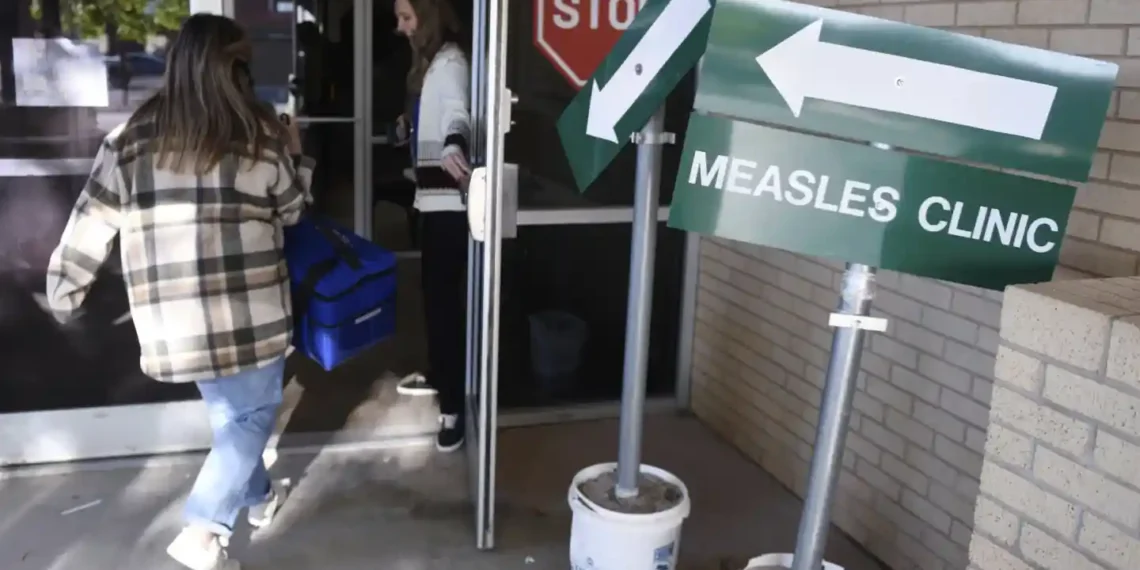Measles is Highly Contagious – Here’s What You Need to Know to Stay Safe
Health officials in New Jersey are urging anyone who attended last week’s Shakira concert at MetLife Stadium to watch for measles symptoms. This comes after it was confirmed that an infectious person was present at the event.
While there’s no confirmed measles outbreak in New Jersey, the U.S. and parts of North America are seeing a rise in cases this year — including hundreds of infections in West Texas. This surge comes as vaccination rates, which protect 97% of people after two doses, have been dropping.
Measles outbreaks are especially common in places like schools and daycares. For example, three public schools in western North Dakota recently sent all unvaccinated students home for 21 days after exposure, following state law.
Here’s a simple guide to understanding measles and how you can protect yourself and your loved ones.
What’s Going On with Measles in the U.S.?
Most children in the U.S. get vaccinated before starting school, but more people are skipping shots for personal or religious reasons. This has caused outbreaks across 30 states so far this year, with over 1,000 cases and 11 states reporting outbreaks (three or more linked cases).
The largest outbreaks are in Texas, New Mexico, and Oklahoma. Canada and Mexico are also seeing significant increases.
What Is Measles?
Measles is a highly contagious respiratory virus that spreads through the air when an infected person coughs, sneezes, or even breathes. It mainly affects children but can infect anyone.
“On average, one infected person may pass measles to about 15 others,” says Scott Weaver, a virus expert. “Very few viruses spread this easily.”
Symptoms start in the respiratory tract and then spread throughout the body. Early signs include a high fever, runny nose, cough, and red, watery eyes. A distinctive red rash appears a few days later, starting on the face and spreading downward. When the rash shows up, the fever can spike above 104°F.
There’s no specific cure for measles, so treatment focuses on easing symptoms and preventing complications.
Can Measles Be Deadly?
While most people recover, measles can be serious, especially for unvaccinated individuals. About 1 in 5 unvaccinated Americans with measles end up hospitalized. Complications include ear infections, diarrhea, pneumonia, and, rarely, swelling of the brain (encephalitis), which can cause lasting damage.
Pregnant women without immunity risk premature birth or low birth weight babies.
“Children are most vulnerable to severe illness,” says Weaver. Pneumonia is the leading cause of measles-related deaths.
How Can You Protect Yourself?
The best protection is the MMR vaccine (measles, mumps, and rubella). The first dose is recommended at 12-15 months old, and the second between 4-6 years old.
Before the vaccine was developed in the 1960s, nearly everyone caught measles. The vaccine is safe, effective, and has decades of proven success.
“We could stop outbreaks if 95% of the population were vaccinated,” Weaver explains. “Unfortunately, many areas have fallen below this crucial threshold.”
Vaccination rates have dropped since the COVID-19 pandemic, putting communities at higher risk.
Do You Need a Booster Shot?
Generally, people who got both MMR doses are protected for life. Testing for immunity is possible, and a booster may be recommended if antibody levels are low or if you are in an outbreak area.
Adults who received a live vaccine in the 1960s don’t need revaccination. But those who got an earlier, less effective killed-virus vaccine before 1968 should get at least one MMR dose now.
People who had measles before or were born before 1957 usually have immunity and don’t require vaccination.
If you have underlying health issues or live with someone at risk, talk to your doctor about whether a booster shot is a good idea.
Bottom Line:
Measles spreads fast but is preventable. Staying up to date with the MMR vaccine is the safest way to protect yourself, your family, and your community.
If you attended the Shakira concert or have concerns about exposure, monitor symptoms closely and consult your healthcare provider.
Stay informed. Stay safe.
This article was rewritten by JournosNews.com based on verified reporting from trusted sources. The content has been independently reviewed, fact-checked, and edited for accuracy, neutrality, tone, and global readability in accordance with Google News and AdSense standards.
All opinions, quotes, or statements from contributors, experts, or sourced organizations do not necessarily reflect the views of JournosNews.com. JournosNews.com maintains full editorial independence from any external funders, sponsors, or organizations.
Stay informed with JournosNews.com — your trusted source for verified global reporting and in-depth analysis. Follow us on Google News, BlueSky, and X for real-time updates.














